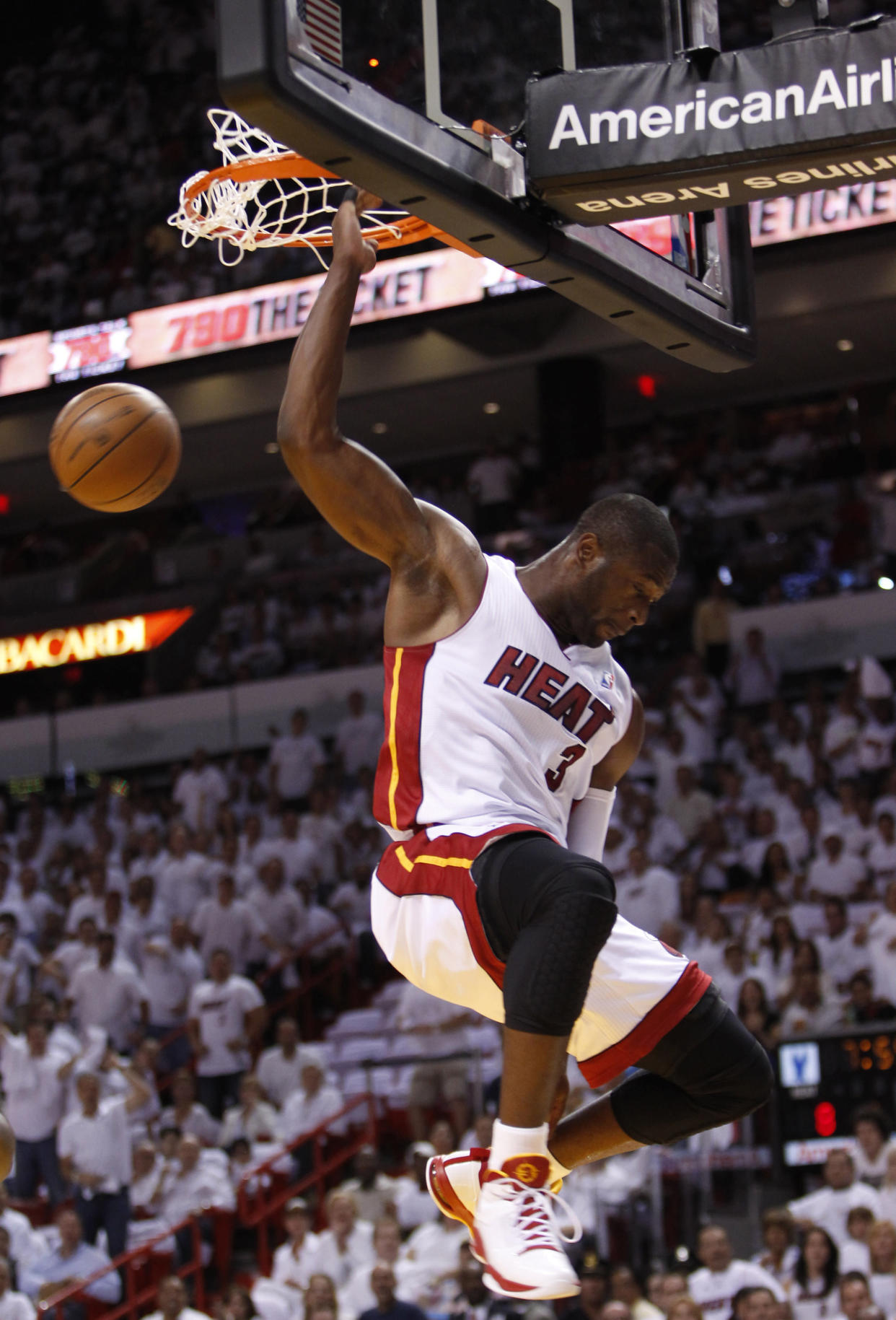The Miami Heat Is The New Corporate Model Of Teamwork, Apparently

I don't even know how to begin with this Fast Company cover story on LeBron James, the Miami Heat and what they teach "us about teamwork." Basically, the article teaches me that the people at Fast Company are capable of teaming up to shoehorn LeBron James onto the cover under the guise of teaching us something about business practices. And it's not just that James can teach us all something about teamwork, it's that the Miami Heat are "the World's Greatest Chemistry Experiment." So, snack on that Richard F. Heck, Ei-ichi Negishi and Akira Suzuki -- and your Nobel Prize winning work in "palladium-catalyzed cross couplings in organic synthesis."
Fast Company advises us:
Forget for a moment that this has anything to do with basketball.
Okay! That's going to be hard, seeing as you've got four NBA-themed pieces for us to work through, but I'll try.
Love HuffPost? Become a founding member of HuffPost Plus today.
Forget about sports altogether.
Almost as if I picked up a magazine that isn't supposed to cover sports. Right.
What LeBron and company are attempting to do applies to any organization that's serious about winning.
Well, who among the Fortune 500 hasn't beaten the Philadelphia 76ers?
A year ago, James, Wade, and Bosh were the top dogs -- the leading scorers -- on their respective teams. Today, they're divvying up the sirloin scraps, at far less pay, in search of one prize: a championship. Yes, they've been derided for conspiring to give Miami a huge leg up at the expense of small-market teams (namely James's former employer in Cleveland and Bosh's in Toronto), but their mutual sacrifice is a resounding vote for teamwork. Teamwork among superstars. It's a huge bet that, in the end, talent will prevail.
If only the San Antonio Spurs had thought about combining superstars -- like, say, Tony Parker, Manu Ginobili, and Tim Duncan -- in their pursuit of NBA glory. (Instead, they wagered that playing great team defense was something that would "prevail.")
Finally, we start getting around to the "forgetting about sports altogether" part:
This is a strategy that's on the rise these days. Look at Silicon Valley. Which tech company, when given the chance, doesn't raid the talent pool, stocking up on the world's best execs and engineers in the hopes of racing past the competition? Late last year, Mark Zuckerberg personally persuaded Lars Rasmussen, the cocreator of Google Maps, to join a host of elite ex-colleagues at Facebook. If ESPN anchor Stuart Scott were to cover the business universe, he would have summed up the acquisition in a word: Boo-yah!
Oh, okay, so here's a new "strategy" that's "on the rise" -- hiring talented people in the hopes that a bunch of talented people will add value to your company. Glad to see people are trying this at last! Of course, this lesson was so well taught to the world by the Miami Heat, that Facebook was employing it just three days after the 2010-2011 NBA season began.
In short, it's a pretty awkward construct, ancient corporate-sounding bromides about "trust" and "teamwork" forced through this "the NBA playoffs are happening" perspective. At times, the piece has to contort in order to keep track of its thesis. "High-priced talent doesn't ensure success," says the magazine, you have to be "buddies," too. And buddies have to leave room for Udonis Haslem and Zydrunas Ilgauskas.
Larry Page and Sergey Brin are a formidable pairing -- much like Hewlett and Packard, Ben and Jerry, the brothers Coen (Joel and Ethan) -- but the truth is none of those guys could have achieved what they did if it weren't for the help of supremely gifted employees. The Heat is no different.
That would have been a really good place to inform readers who the "Zydrunas Ilgauskas of Google" is. (It still would be, if anyone would care to provide that information.) By the way, that marks the last time in the article that an attempt is made to connect this Miami Heat metaphor with an example in the corporate world, save for one stray mention of Carl Icahn.
The piece goes on to really gloss over the ugliness that's gone down between the team and their coach, Eric Spoelstra, who is nominally in charge of the "strategic vision."
I'm not entirely sure what to make of how this season's brief Spoelstra-drama fits within this idea that stocking up on superstars is a winning strategy. The message seems to be: star talent is important, as long as Zydrunas Ilgauskas is around to do the thankless work, and your CEO is okay accepting abuse from the talent pool while never retaliating by telling the media that your star players cried in the locker room. And, in the end, it really helps to have Pat Riley to talk to about your feelings.
It's kind of a mess. But there's one success strategy that seemed to work for the Heat:
After the game, Wade and his teammates held a players-only meeting. "They kicked the coaches out," says Windhorst. "It was literally in the shower. Guys were telling each other to stop playing afraid."
Not sure you should try to replicate that in the workplace! At any rate, every tech company should definitely try to hire Mike Miller, the end.
[Would you like to follow me on Twitter? Because why not? Also, please send tips to tv@huffingtonpost.com -- learn more about our media monitoring project here.]
This article originally appeared on HuffPost.

